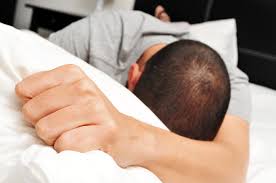 Postorgasmic illness syndrome (POIS) is a syndrome involving chronic physical and cognitive symptoms following orgasm.
Postorgasmic illness syndrome (POIS) is a syndrome involving chronic physical and cognitive symptoms following orgasm.
The symptoms usually onset within seconds, minutes, or hours, and last for up to a week.
it is considered a rare disease,that typically affects men but in rare instances can affect women.
Signs and symptoms of POIS:
rapid onset of symptoms after orgasm;
the presence of an overwhelming systemic reaction
Can include some combination of the following: cognitive dysfunction, aphasia, severe muscle pain throughout the body, severe fatigue, weakness, and flu-like or allergy-like symptoms, such as sneezing, itchy eyes, and nasal irritation.
Additional symptoms include headache, dizziness, lightheadedness, extreme hunger, sensory and motor problems, intense discomfort, irritability, anxiety, gastrointestinal disturbances, craving for relief, susceptibility to nervous system stresses, depressed mood, and difficulty communicating, remembering words, reading and retaining information, concentrating, and socializing, experiencing intense warmth or cold.
The 7 clusters of symptoms of criterion:
General: Extreme fatigue, exhaustion, palpitations, problems finding words, incoherent speech, dysarthria, concentration difficulties, quickly irritated, cannot stand noise, photophobia, depressed mood Flu-like: Feverish, extreme warmth, perspiration, shivery, ill with flu, feeling sick, feeling cold Head: Headache, foggy feeling in the head, heavy feeling in the head Eyes: Burning, red injected eyes, blurred vision, watery, irritating, itching eyes, painful eyes Nose: Congested nose, watery/runny nose, sneezing Throat: Dirty taste in mouth, dry mouth, sore throat, tickling cough, hoarse voice Muscle: Muscle tension behind neck, muscle weakness, pain in muscles, heavy legs, stiff muscles
80% of respondents always experienced the symptom cluster involving fatigue, insomnia, irritation, and concentration difficulties.
Symptoms usually begin within 30 minutes of orgasm, and can last for several days, sometimes up to a week.
Symptoms may be delayed by 2 to 3 days or may last up to 2 weeks.
POIS that is manifest from the first ejaculations in adolescence is called primary type; POIS that starts later in life is called secondary type.
Many individuals with POIS report lifelong premature ejaculation, with intravaginal ejaculation latency time of less than one minute.
Post-coital tristesse (PCT) is a feeling of melancholy and anxiety after sexual intercourse that lasts anywhere from five minutes to two hours.
Post-coital tristesse affects both men and women, occurs only after sexual intercourse and does not require an orgasm to occur, and in that its effects are primarily emotional rather than physiological.
POIS affects both men and women but more frequently affects men, consists primarily of physiological symptoms that are triggered by orgasm and that can last, in some people, for up to a week.
While PCT and POIS are probably distinct conditions.
Other findings that may show up as restlessness, irritability, increased sexual frustration, apathy, sluggishness, neediness, dissatisfaction with a mate, or weepiness , may occur over the days or weeks after intense sexual stimulation, with such phenomena may be part of human mating physiology itself.
Sexual headache is a distinct condition characterized by headaches that usually begin before or during orgasm.
The cause of POIS is unknown.
Hypotheses include: Type-I and Type-IV allergy to the males’ own semen; auto-immune reaction not to semen, but to a different substance released during ejaculation, such as cytokines; a hormone imbalance, such as low progesterone, low cortisol, low testosterone, elevated prolactin, hypothyroidism, or low DHEA,a defect in neurosteroid precursor synthesis; withdrawal hypothesis where majority of POIS symptoms like fatigue, muscle pains, sweating, mood disturbances, irritability, and poor concentration are also caused by withdrawal from different drug classes.
POIS patients may have a history of excessive masturbation, suggesting that POIS could be a consequence of sex addiction.
POIS could be caused by hyperglycemia or by chemical imbalances in the brain.
Intense emotional stimuli during sexual intercourse can lead to autonomic imbalance with parasympathetic over-reactivity, releasing mast cell mediators that can provoke postcoital asthma and / or rhinitis.
It is also possible that the causes of POIS are different in different individuals.
No agreed upon diagnostic criteria for POIS.
Five preliminary criteria for diagnosing POIS:
sensation of a flu-like state, extreme fatigue or exhaustion, weakness of musculature, experiences of feverishness or perspiration, mood disturbances and / or irritability, memory difficulties, concentration problems, incoherent speech, congestion of nose or watery nose, itching eyes; all symptoms occur immediately (seconds, minutes or within a few hours) after ejaculation that is initiated by coitus, and / or masturbation, and / or spontaneously. symptoms occur always or nearly always, e.g., in more than 90% of ejaculation events most of these symptoms last for about 2–7 days; and disappear spontaneously.
POIS is prone to be ascribed to psychological factors such as hypochondriasis or somatic symptom disorder.
There is no standard method of treating or managing POIS.
Affected individuals typically avoid sexual activity, especially ejaculation.
Sexual activity may be scheduled at times when they can rest and recover for several days afterwards.
If post-coital tristesse (PCT) is suspected, patients could be treated with selective serotonin reuptake inhibitors.
The prevalence of POIS is unknown.
POIS seems to affect mostly men from around the world, of various ages and relationship statuses.
